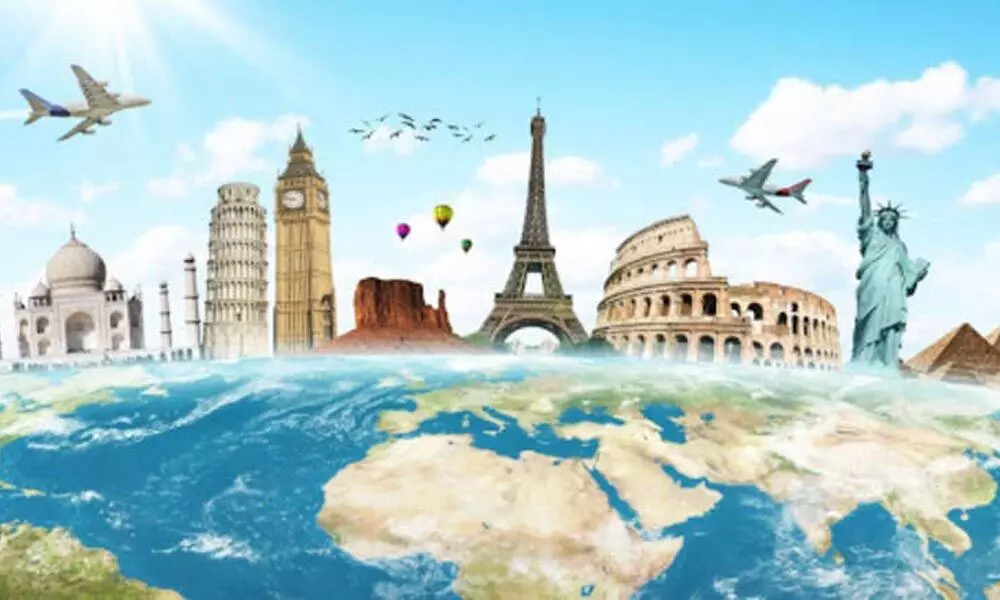Tourism sector likely to recover by 2023
According to the latest data from UNWTO, the pandemic led to 73% fall globally in international tourist arrivals in 2020
image for illustrative purpose

Promotion of domestic tourism, as well as the creation of 'travel bubbles' that would allow travel to resume among certain destinations, were highlighted as potential strategies for driving recovery in the short-term for tourism sector at WTO Aid-for-Trade Stocktaking Event
The Asian Development Bank (ADB) partnered with the UN World Tourism Organization (UNWTO) to lead a conversation on what the Covid-19 pandemic's impact on global tourism means for development across the Asia-Pacific region. Held as part of the World Trade Organization's Aid-for-Trade Stocktaking Event, the special session brought key sector representatives together to assess how the sector can be transformed to drive recovery and build sustainability.
According to the latest data from UNWTO, the pandemic led to a 73 per cent fall globally in international tourist arrivals in 2020. The drop has been even steeper in Asia-Pacific where ADB estimates a decline of over 80 per cent for 2020, as many Asian countries continued to impose strict travel restrictions. This sudden fall has placed the sector's ability to drive sustainable development forward on hold.
Destinations worldwide welcomed 1 billion fewer international arrivals in 2020 than in the previous year, due to an unprecedented fall in demand and widespread travel restrictions. This compares with the 4 per cent decline recorded during the 2009 global economic crisis.
According to the latest UNWTO World Tourism Barometer, the collapse in international travel represents an estimated loss of $1.3 trillion in export revenues - more than 11 times the loss recorded during the 2009 global economic crisis. The crisis has put between 100 and 120 million direct tourism jobs at risk, many of them in small and medium-sized enterprises.
The overall prospects of a rebound in 2021 seem to have worsened. 50 per cent of respondents now expect a rebound to occur only in 2022 as compared to 21 per cent in October 2020. The remaining half of respondents still see a potential rebound in 2021, though below the expectations shown in the October 2020 survey (79 per cent expected recovery in 2021). As and when tourism does restart, the UNWTO Panel of Experts foresee growing demand for open-air and nature-based tourism activities, with domestic tourism and 'slow travel' experiences gaining increasing interest.
Building Sustainability and Resilience
The special event at WTO, moderated by Anna Fink, Economist at ADB, explored how 'aid-for-trade' can be used to build greater sustainability and resilience in the tourism sector. Joining Matthias Helble Senior Economist at the Asian Development Bank and ZoritsaUrosevic Director of Institutional Relations and Partnerships at UNWTO were representatives from the governments of Azerbaijan and New Zealand, and Suzanne Becken, a tourism expert from Griffith University.
According to latest ADB estimates, a full recovery for the sector is only expected by 2023 at the earliest. Promotion of domestic tourism, as well as the creation of 'travel bubbles' that would allow travel to resume between certain destinations, were highlighted as potential strategies for driving recovery in the short-term. The introduction of vaccine passes could further accelerate recovery. However, these measures should only be temporary, and countries ultimately need to prepare for a full opening.
A prolonged pandemic puts the survival of large parts of the tourism sector at risk. To help governments finance policy measures that facilitate targeted aid to households and firms most severely affected by the pandemic, ADB launched a $20 billion support package in April 2020. By the end of 2020, ADB had committed $16.3 billion of this package in the form of grants, technical assistance, and loans to developing member governments and the private sector. At the same time, UNWTO has expanded on its support to Member States across the region, including through the launch of the UNWTO Tourism Recovery Technical Assistance Package, delivering expert support to destinations across the historic Silk Road.
There is a need for developing a new finance architecture to adopt and build innovative, low carbon, circular, safe, and inclusive business policies, and instruments for recovery. At the same time, both ADB and UNWTO reiterated the importance of international cooperation and the harmonization of policies, both to restart international tourism and then to monitor and guide future growth to ensure the sector delivers on its potential to drive sustainable development.
Global coordination is essential for tourism to deliver on its status as a leading generator of opportunity for all. UNWTO leads the way forward, uniting tourism leaders from all over the world. Now more than ever, there is a need for a sector united on behalf of the millions of people who have trusted their future to the power of tourism to drive sustainable growth.

